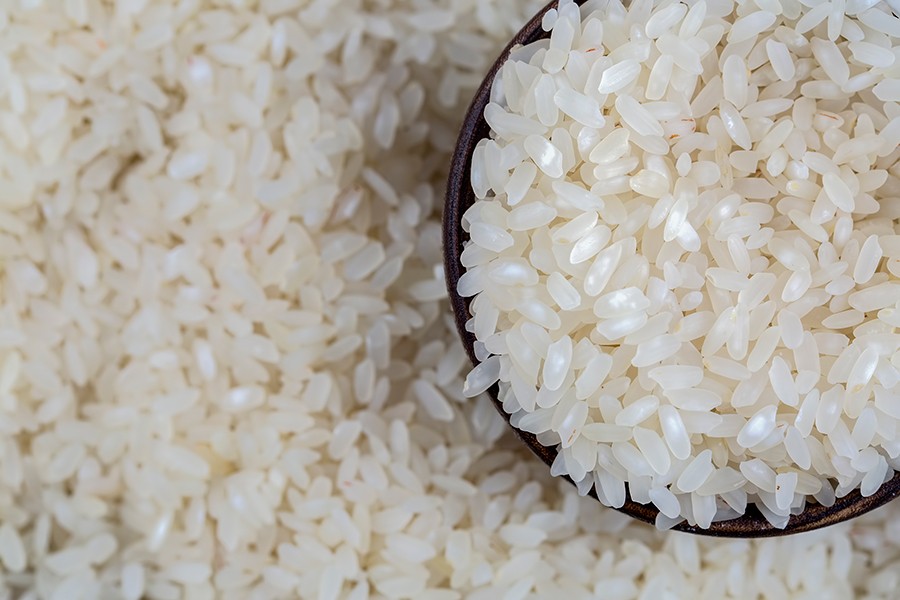
Published :
Updated :

The initiative to export parboiled rice from Bangladesh is yet to make any headway due to lack of proper incentives, according to traders.
Export of this daily-consumed white rice was banned in the country in 2009, and export of only fragrant rice was allowed on a limited scale.
The government in this financial year, FY ’20, has withdrawn the ban amid a drastic fall in paddy prices following a record production of the staple that has come as a severe blow to farmers.
However, export of fragrant rice has marked a good progress, and it can be further raised, if provided with incentives, the traders added.
Bangladesh exported above 22,400 tonnes of rice worth US $ 17.7 million in last fiscal year (FY ’19), of which 100 per cent was fragrant rice. The export was 11,000 tonnes worth $ 7.13 million in FY ’18, according to the Bangladesh Rice Exporters Association (BREA) and the Export Promotion Bureau (EPB).
In the first three months of the current FY, from July to September 2019, local exporters exported 2,500 tonnes of rice, of which more than 99 per cent was of fragrant varieties.
Ishaqul Hossain Sweet, proprietor of Tohfa Enterprise, one of the country's leading rice exporters, said they were exporting fragrant rice at $600-$800 per tonne to some countries like the US, the UK, Italy, Hong Kong, Malaysia, Singapore, Australia, Middle-East, North Africa and South Africa.
"Despite trying for the last three months, we've failed to get any buyer for local parboiled rice, as Pakistani, Thai, Burmese and Vietnamese rice is more competitive than ours."
He also said Indian, Pakistani, Burmese and Vietnamese non-basmati rice is being sold at $323-$404 per tonne based on quality. On the other hand, Bangladeshi exportable parboiled (non-basmati) rice will cost $352-$450 now.
"These countries also have some established markets, which we don't have. Their exporters are also getting 5.0 to 20 per cent incentives."
He noted that local rice exporters were struggling hard for the last few years.
However, they have been able to find markets in countries like the US, the KSA, Italy, the UAE, Malaysia, Kuwait, Singapore, Hong Kong, Jordan, Qatar and Oman.
"Many African countries are also contacting us for taking non-basmati rice from here. But we couldn't supply them rice amid comparatively high prices in our country," he added.
Shah Alam Babu, president of the BREA, said without incentives, their export would not be profitable.
"Domestic market, rather than international market, will remain more lucrative for local traders."
He also said big millers in the country were asking the traders to find out buyers for them.
But the traders cannot do it, as the prices offered by the foreign rice buyers are much lesser compared to the millers' production costs.
If the government declares a 20 per cent incentive on rice export and the trend of domestic production continues as it is, Bangladesh has the possibility to make a good stand in the world rice market, he opined.
An official at the Ministry of Agriculture (MoA) said the country now has capacity to export at least 1.0 million tonnes of rice following high domestic production as well as 1.5 million tonnes of the government storage.
Besides, rice production in Aman season is also likely to be a bumper one.
He further said the Philippines and Bhutanese traders are showing interest in buying Bangladeshi rice and paddy, but any progress is yet to be made in this regard.
The MoA is going to request the Ministry of Commerce (MoC) to give incentives on rice export for now, he added.
Professor Abdul Hamid, chairman of the Bangladesh Agrarian Research Foundation (ARF), said local farmers are likely to incur loss even in the Aman harvest season amid the present low prices of paddy.
Paddy of Boro and Aus seasons are still selling in the market at Tk 500-Tk 650 a maund (40 kg) against their production costs of Tk 800-Tk 960 a maund.
He also said the MoC should immediately think about the matter and take necessary steps to give incentives against rice export.
"It can be an effective option apart from the government's procurement drive to help farmers make some profit from rice cultivation," he concluded.
Rice production reached an all-time high of 37.3 million tonnes in FY 19, according to the BBS primary estimation.
The demand for rice in the country is maximum 32 million tonnes, according to the MoC.


 For all latest news, follow The Financial Express Google News channel.
For all latest news, follow The Financial Express Google News channel.